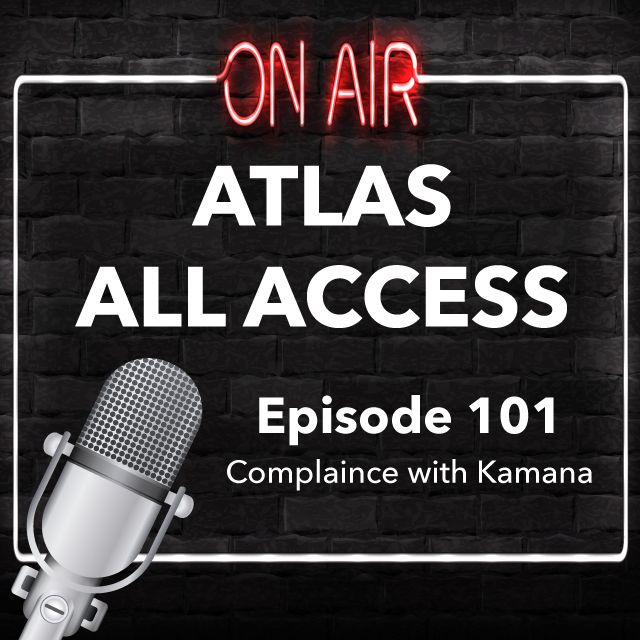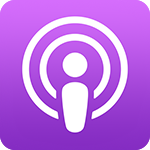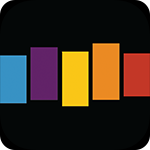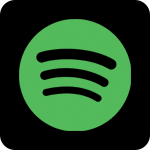
We Talk Travel Healthcare Compliance With Kamana - Atlas All Access 101
01-09-2020
Compliance is a complex piece when you're a traveling healthcare professional. Kamana is a free platform that can help you better organize and streamline the compliance process. The control is in your hands. Check it out here: kamanahealth.com
Scroll to the bottom or their website (kamanahealth.com) and feel free to reach out to Dave or John with any questions.
Rich: Traveler compliance is always changing and we know how much you love compliance documents. So let's watch a whole vlog about compliance with the guys from Kamana. Atlas All Access starts now.
Rich: Okay, so John, Dave, welcome to Omaha.
John: Thank you.
Rich: John and Dave from Kamana. We've talked before. This is the first time that we've ever met in person. So I ditched you guys at SIA because it was way too busy and I apologize for that. That's completely my fault.
John: Yeah, no worries.
Rich: But, we talked on the phone... Gosh, what? Three, two months ago?
Dave: Yeah, about two or three months ago.
Rich: Or whatever. And it was interesting enough that when you said, "Okay, when you're coming to Omaha, let's talk about this just a little bit more." Compliance has always been one of those things where it's the necessary evil. It's hard to talk about because it's frustrating. It's hard to do. It's hard to keep up with. You guys may have found the key to making it work and making it work right. So let's start from the beginning.
Rich: John, you were a traveler?
John: Yeah, that's right.
Rich: You're a registered nurse traveler in the ER, right?
John: That's right.
Rich: Talk to me about your background a little bit.
John: Yeah, definitely. So like you said, 10 years in the ER now, with the bulk of that time being a traveling nurse going around the country. We all know, awesome career. But with that comes this just conglomerate of credentialing, right? So whether I'm looking for another contract, if I'm talking to a few different staffing agencies, each one they need to know what am I qualified for, what am I looking for? It's all about speed of submittal so I got to get this stuff over quickly. So anywhere I'm going, I've got to bring my paper documents all in my folder. Then I've got pictures on my phone of different certifications and I've got my laptop with stuff.
John: So then when I would find that awesome opportunity, I'm scrambling to get all this stuff together. If they have an application, I've got to fill it out. I've got to get all this stuff over to you, you're telling me hurry up, let's get you submitted for this job. Just looking at the space like there's got to be a better way to do this, there's got to be an easier way for me to be more organized with my stuff. And then when you need it, a just more secure, streamlined way to get it to you.
John: So it got us looking at the space, honestly, looking for solutions and not seeing them and saying let's go after this. And Dave being a long time buddy that heard me and watched me struggle and complain about this long enough, we decided to take some action and make things better.
Rich: So when did you start? Like what was the first day like, okay, that's it. We're going to do it and let's go find a programmer and let's make this happen.
Dave: Yeah, for sure. It was last summer, I guess August, September, right before I was kind of headed out and actually transitioning out of a job and into another one. I went and spent a couple of months with this guy and his wife when he was on contract in Alaska. Me being up there, kind of hanging out, watching his phone ring, watching all this stuff he's doing, and we started looking at the space and so that was maybe September of last year, and after that I actually moved to Denver, was going to go try and get a job at a startup as I transitioned out of my last company and ended up starting one instead.
Rich: Awesome. And so your first day on the job, like the website goes live, which is interesting because as we kind of talked through this, what you showed me today versus what I saw two months ago was different already. Right? How many... I mean it's gone through a number of iterations obviously, but that first day, when was that first day?
Dave: Yeah, that's a great question. So this was all around last year, September last year we started. We had our team buttoned up. We brought on a full stack developer as a founder, as well as somebody coming in with design and we're part time for awhile. We ended up launching essentially this digital wallet for travelers to track, store, share their credentials around mid-May of this year. In full kind of startup technology style, we launched that basically the moment they could store a license and that was it. So we put it out there and we started talking to travelers. We said, "Hey, we might have a better way for you to do this stuff," and we've just been using their feedback to really drive the development of the platform.
Rich: And so you were at TravCon for the first time in 2019, right?
John: We were, yeah.
Rich: How did that go? Like what was the reception there?
John: Yeah, it was awesome. I mean, first of all, like Dave said, we started as soon as there was some functionality. It started with us getting our friends in that we know that are nurses like, "Hey, try this out. Tell us what we need to do better, tell us what you like, tell us what's missing." So then it turned into just online reaching out to folks that we saw complaining and presenting Kamana as a solution to some of these struggles. But TravCon was the first time that we were interacting with nurses that we didn't know, so it was really cool to see strangers that it's not going to be your friend that's going to be a little more soft around, like getting strangers in there and lighting up and seeing and being like this is really, really awesome. Getting there, building out their profile. And then really I think it was cool the next day them coming back and saying, "Hey look, I already completed my profile. Shared it with five recruiters and I brought my friend here. Tell her about Kamana." It was like that's really, really cool.
Rich: That's super cool.
John: Yeah.
Rich: So let's talk about the product itself. What can it do for the average traveling healthcare professional today?
John: Yeah, for sure. So it works for nurses, works for allied health care professionals. So what Kamana is is you go on and it's a free secure platform where you go on as this healthcare professional, you build out your profile and it's basically everything that's needed for your professional career as a traveler. So we've got all of our work history in there. We've got what we call opportunity preferences, where I'm looking for in that next contract could be a couple different things.
John: I've got my license is in there, my certifications, I have the actual attachments associated with them. I'm getting expiration reminders on when things are expiring. Same thing with medical documents. This is a place for me to store all those varicella vaccines, MMRs, titers, all of this stuff, so no more paper and just fragmented all over the place. Store it all in there. And then if Rich calls me, he's got a great job, I can share access into this profile. So you get a link, you can see, I can either give you an overview so you can just see what I'm looking for, see what I'm qualified for, see if we have a match, and then if we choose to move forward with a contract, I can turn over access to those documents. It's important to us not to be texting and emailing a lot of this sensitive data, because that's how it can get compromised. You can get your data hacked. So yeah, that's what Kamana is. It's free for the nurse and free for the traveler, free for the recruiter they choose to use it with.
Rich: So talk about data privacy for a little while, because I think that's something that we struggle with maybe on the agency side all the time, not necessarily the privacy part, but the transmission of when you email documents like that. Email social security card, email or whatever. There's always an inherent risk, whether it's us or Target or whoever, right, when you're sending that kind of sensitive information. Talk about how it's different and how you secure that information.
John: Yeah, 100%.
Dave: Yeah. For sure. I'll take that. So essentially for the traveler themselves, they're used to texting and emailing this stuff and sometimes email is secure, but it's only as secure as the user who's using the email and if you use a bad password it's easy to get hacked. And throughout this process John's actually gotten several breach notification from agencies that are not Atlas about his data being compromised. So the data privacy is really, really important to us. So as a company we don't sell data, first of all. So it comes in, it doesn't go anywhere unless you choose to share it.
Rich: Gotcha.
Dave: Second of all, from an actual technicality standpoint, not to get into the super boring details, but we use several forms of encryption both on our servers, the database in the field level and make sure that if somebody were to hack our system, they would basically just get a bunch of spaghetti words that don't mean anything. So everything is secure.
Dave: Basically John described you inviting a nurse in, or I'm sorry, inviting a recruiter in or a compliance manager in to access the documents, you're making or breaking a link into your profile. It's not actually ever leaving the system. It's going right from the internet to that computer and then they're able to pull them out. So I'm not transmitting those documents ever over text or email.
Rich: Gotcha. And this is a question that I'm sure you'll address down the road as we kind of talk through this, but it's you send a link. You say, "Okay, I'm ready to try Atlas or whatever." You send me that link, I click that link. It has all that information in there. Maybe you decide, "Oh, Atlas isn't for me." You can turn it off then, right?
Dave: You can.
John: Yeah.
Rich: And then that's it. I click that link again and nothing happens.
Dave: That's right. So you actually, a little something happens. You get blown up to a nice spaceman image that shows you being lost in space.
John: We made it a little fun when the nurse cuts you off.
Rich: Awesome. I think something's important there that you said as you were kind of going through the data part, is you're not going to sell their information. So you are 100% not a lead generator.
Dave: One hundred and fifty percent.
Rich: Gotcha. And I think that's important too because there is a sense out there that, okay, here's another company, right? Here's another one that wants some piece of the pie or whatever. Because we hear that, right. And I know everyone knows what I'm talking about. You guys know what I'm talking about. I'm sure you heard it at TravCon. You're not going to sell that data. Someone signs up with you, Nurse A signs up with you and then doesn't do anything with that. If they age out or whatever, you're not going to try to sell that information to do something with it down the road.
John: No, definitely not. And we have nurses that come on, they make a profile and they just want to have a digital wall to keep reminders on when their stuff's expiring. That stuff can live there forever. It's not going anywhere. It's totally up to them. But yeah, and it's not just a disservice to the nurse of selling their data without them knowing, without their permission. But it's also, I don't think that's valuable to the person that you're giving it to. Because now you're selling data that they didn't want out in the first place. They're not going to want those phone calls that are going to come. But yeah, I think the industry's moving away from the lead generators. I don't think the value's there for the staffing agency and it's definitely not there for the clinician.
Rich: I can tell you 100% that there aren't... People don't just go to a random landing page, type their information in, I want to go to Southern California and then wait for an agency to call them back.
John: Right.
Rich: It was like that 10 years ago maybe. It's not like that now. And there are still plenty of them out there. There's still a whole lot of them out there. And I can tell you we don't buy those.
John: Sure.
Rich: It just isn't... it doesn't work.
John: Right.
Rich: It just doesn't work. So, okay. Who then is your target audience? As you kind of go through this, is it new travelers, is it experienced travelers? Is it us on the agency side? If you had... Paint that perfect picture, like who is that person for you?
Dave: For sure. So I think on the healthcare professional side, we want... a nurse is going to come, they're going to start their travel career. It makes sense to start it with a Kamana profile. That way they're keeping their data secure and they're speeding up process and creating operational efficiency from day one. So new travelers obviously great and we found with the more experienced travelers, a lot of them like John, five years in and still struggling with some of this compliance stuff. So I think if you're not a person who's figured out how to basically digitize and share your documents securely, you've got a place on Kamana.
Dave: And then secondly people wonder like, okay, why is it free? How do you make money? So we make money because we also offer a product now for staffing agencies to as their actual candidate compliance application portal, so that's where the revenue is coming from. So that way we're able to provide the service for free for the nurse. And then it just gets into a little bit more of the product dynamics. But if I'm a nurse and I've gone to Kamanahealth.com and I've made a profile and then I'm working with an agency that's using our compliance portal, all I have to do is basically authorize in and all my information is going to show up into their database.
Rich: And it's interesting that you say that too. From an agency standpoint, this isn't any different than anything else we've ever paid for before. So every agency will pay for some sort of credentialing piece, from a storage data safety standpoint, every one of them has this.
Dave: Right.
Rich: So you're another option like that, but then you have that faces the traveler as well, where a lot of them, there's... Actually, you know what, I can't think of one that has another, like has a traveler facing piece as well. It's only on our end.
Dave: Right.
Rich: On the agency end. So it's an interesting take on it.
Dave: For sure. I mean we're excited about it because as candidate experience really becomes more and more important in the industry and like travelers have a choice, like where am I going to work? I'm going to work with someone that I have a good experience with. So ultimately by providing that front facing piece, we're providing the candidate a lot of value, but also the agency value because you're no longer chasing down those candidates for documents and having to go through this five, seven, 10-day onboarding process. It can be done with the click of a button. And then also working with these other type of backend systems, we're coming in and we're looking at like what is being done manually in these systems and we're automating that. So it's not just the benefit on the front end. All the operational workflows for the agencies are being picked up by automations and things around compliance and credentialing and candidates admission packages and stuff like that.
Rich: Awesome. Okay. All right, last question. You're a year and a couple months in, right? Where do you see yourself in five years, seven years, 10 years? Where do you want to be?
John: Yeah, that's a great question. I think first of all, we want Kamana to be the first place that the traveling healthcare professional goes so that they can get started off on the right foot, so they don't end up on that sketchy lead generator side or they don't end up sending their data over via insecure means and stuff like that. And also to give them that professional way to present themselves to staffing agencies and make things more efficient there. We see Kamana being the place, the digital wallet for the healthcare professional replacing the resume, replacing a lot of these old ways of sharing this data. End goal is trying to reduce the cost of travel healthcare so that more staffing agencies can be more efficient, they can be more profitable, hospitals can pay less to have travelers come in, and it's easier for travelers to come in and they can make more money and we can just continue to grow this already growing industry by making it more efficient, making it easier to navigate.
Rich: Makes sense.
John: Yeah, 100%. I'll just piggy back that and say there's just a lot of operational inefficiency, financial waste, lapses in data security. Our goal is to come in and fix those things. If a traveler's doing something twice, we want to eliminate it. And if a recruiter's doing something twice, we want to eliminate it and that goes down all lines of the staffing agency.
Rich: Awesome. Well, I hope you've enjoyed your time in Omaha so far.
John: We have.
Rich: I mean the weather's not awesome. Actually, you know what? It's not-
John: It's actually really nice.
Rich: It's not half bad right now.
John: Yeah.
Rich: I mean, you're used to Denver. So I mean that's... the snow sticks around maybe a little bit longer than it would.
Dave: Right.
Rich: But anyway, anytime you come to Omaha, you're welcome here.
John: We'll take you up on it.
Rich: It'll be interesting to see kind of as you guys grow, how the product changes and evolves and some of the stuff that we talked about earlier before the cameras were on, when that comes to be.
John: Right.
Rich: There are a lot of fun updates coming and I don't obviously want to spoil any of them, but it seems like an evolving, growing product, and one that a lot of traveling healthcare professionals could use down the way. I think you just... they have to get over that oh no, here's another product.
John: Right.
Dave: For sure.
Rich: And I'm telling you, as I've seen a lot of products, this one's a little bit different. So take a look at it, we'll put the website, kamanahealth.com, right?
Dave: Yep.
Rich: Kamanahealth.com. We'll put it down right here. You can talk to either one of these guys, all you've got to do is scroll all the way down to the bottom of the page and you can see them down there.
Dave: There we are. We're there to chat and you hit us up and one of us will respond.
Rich: Absolutely. All right fellas. John, Dave, thank you so much. I appreciate it.
John: Yeah.
Rich: All right.
John: Thank you, Rich.
Dave: Thank you, Rich.
Rich: Cheers. We'll see you next week.



